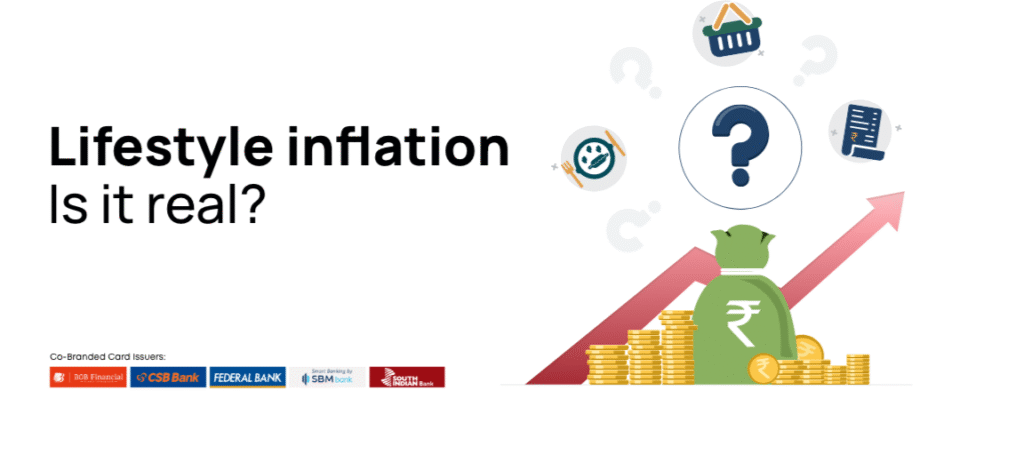Introduction: The Enemy You Didn’t See Coming
Imagine this: You get your first decent job, start earning ₹40,000/month, and manage to save ₹5,000.
Fast forward a few years—you’re now making ₹1,00,000/month. But your savings? Still stuck at ₹5,000. Or worse, you’re in debt.
What happened?
Welcome to the world of Lifestyle Creep, one of the most silent yet dangerous enemies of long-term financial well-being. Unlike bad investments or job loss, it’s invisible—masked as success, comfort, or even “self-care.”
But make no mistake: Lifestyle creep kills wealth.
What is Lifestyle Creep?
Lifestyle Creep (also called Lifestyle Inflation) is when your expenses rise in proportion—or faster—than your income. As you earn more, you slowly start spending more, not always because you need to, but because you can.
Over time, you may:
- Upgrade your car
- Move to a more expensive apartment
- Order in food more often
- Subscribe to more OTT platforms
- Increase travel and luxury shopping
These may seem harmless individually, but collectively, they erode your capacity to save and invest.
Why It’s So Dangerous
- It Feels Justified
“I’ve worked hard, I deserve this.”
It’s natural to reward yourself—but unchecked lifestyle upgrades slowly become necessities. - It’s Hard to Spot
There’s no sudden drop in bank balance—just tiny leaks. ₹200 here, ₹1500 there. The net effect? Thousands lost every month. - It Creates a High Burn Rate
If you need ₹85,000 a month just to “maintain” your lifestyle, a job loss or emergency can wipe you out fast.
Real Example: A Tale of Two Friends
| Details | Sameer | Rahul |
|---|---|---|
| Monthly Salary | ₹60,000 | ₹60,000 |
| Lifestyle Upgrade After Raise | Yes | No |
| Monthly Spending | ₹55,000 | ₹40,000 |
| Monthly Saving | ₹5,000 | ₹20,000 |
| After 5 Years (at 10% return) | ₹3.95 Lakh | ₹15.80 Lakh |
Rahul saved over 4x more than Sameer just by resisting lifestyle creep.
The Psychology Behind Lifestyle Creep
- Anchoring Bias: Once you get used to a higher standard of living, it’s hard to scale back.
- Social Comparison: We spend to match peers—even subconsciously.
- Hedonic Adaptation: That new iPhone or holiday brings temporary happiness, but soon becomes the “new normal.”
Statistics That Show the Problem is Real
- A study by Mint (2023) found that 58% of Indian millennials increase their spending within 3 months of receiving a raise.
- A 2022 ET Wealth survey showed that 60% of urban professionals save less than 20% of their income, even those earning ₹1,00,000+ monthly.
- According to RBI data, household financial savings as a % of GDP dropped to 5.1% in 2023–24, down from 7.3% in 2021–22.
What Does Lifestyle Creep Look Like?
| Raise | New Spend |
|---|---|
| ₹5,000/month raise | New gym membership (₹2,500), weekly Swiggy orders (₹2,000) |
| ₹20,000 bonus | New phone EMI (₹2,800/month) |
| ₹10,000 raise | Upgrade to Uber Premium or move from PG to 1BHK |
Creep = Gradual + Comfortable + Unnoticed
How to Detect Lifestyle Creep in Your Life
Ask yourself:
- Am I saving more since my last raise?
- Did I start new EMIs or subscriptions this year?
- Have my needs become more expensive?
- Do I justify expenses as rewards more often?
How to Avoid or Reverse Lifestyle Creep
1. Automate Your Savings First
Before you upgrade your spending, increase your SIP or savings contribution.
Rule of thumb: “50% of every raise goes into savings or investments.”
2. Live Below Your Means, Not Just Within It
Aim for a 20–30% saving rate, even as your income grows.
3. Do Lifestyle Upgrades Only with Purpose
Instead of upgrading everything, upgrade what truly adds value—health, learning, family experiences.
4. Track Your Expenses
Use apps like Jupiter, Walnut, Cred, or Goodbudget. They help detect where new spending has crept in.
5. Review Subscriptions Quarterly
Most people forget they’re paying for platforms they rarely use.
When Is Lifestyle Inflation Okay?
Lifestyle upgrades aren’t evil. They are justified when:
- Your financial goals are on track
- You’ve built an emergency fund
- You’re increasing investments alongside
- The new expense improves quality of life (not just convenience)
Quotes from Experts
“It’s not what you earn that matters. It’s what you keep.”
— Robert Kiyosaki, author of Rich Dad Poor Dad
“Avoid lifestyle inflation by behaving like your old broke self even when you start earning more.”
— Ramit Sethi, I Will Teach You to Be Rich
“Wealth is what you don’t see. It’s the cars not purchased. The clothes not bought. The expensive dinner not eaten.”
— Morgan Housel, The Psychology of Money
Final Thoughts: Keep Wealth Quietly Growing
Success isn’t about how much you spend—it’s about how much freedom you create.
Lifestyle creep robs you of that freedom, silently, slowly, and often proudly.
The next time you get a raise, ask yourself:
Should I upgrade my lifestyle?
Or should I upgrade my wealth?
If you build the discipline early, you’ll wake up one day with not just comfort—but peace, choices, and real wealth.

